

Audience... Titles... Karl Polanyi. Polanyi's approach to the ancient economies has been applied to a variety of cases, such as Pre-Columbian America and ancient Mesopotamia, although its utility to the study of ancient societies in general has been questioned.[2] Polanyi's The Great Transformation became a model for historical sociology.
Polanyi dismissed Smith's view that man has a predilection for labour but didn't dent mans predilection for work which reflects a human desire to be creative, productive & regenerative for the benefit of self, family & communities – gehan
His theories eventually became the foundation for the economic democracy movement.
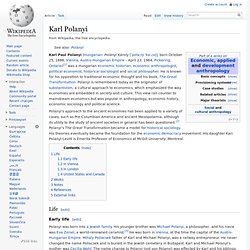
His daughter Kari Polanyi-Levitt is Emerita Professor of Economics at McGill University, Montreal. Life[edit] Early life[edit] Polanyi was born into a Jewish family. Polanyi founded the radical and influential Club Galilei while at the University of Budapest, a club which would have far reaching effects on Hungarian intellectual thought. Embeddedness. In economics and economic sociology, embeddedness refers to the degree to which economic activity is constrained by non-economic institutions.
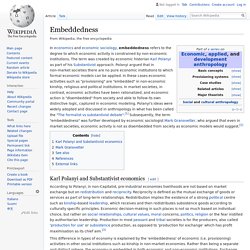
The term was created by economic historian Karl Polanyi as part of his Substantivist approach. Polanyi argued that in non-market societies there are no pure economic institutions to which formal economic models can be applied. In these cases economic activities such as "provisioning" are "embedded" in non-economic kinship, religious and political institutions. In market societies, in contrast, economic activities have been rationalized, and economic action is "disembedded" from society and able to follow its own distinctive logic, captured in economic modeling.
Commodification - turning work into labour. Adam Smith. The Human Condition (book) The Human Condition, published in 1958, is one of the central theoretical works of the philosopher Hannah Arendt.
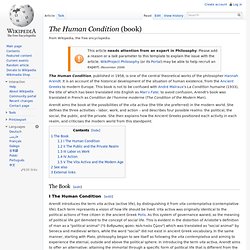
It is an account of the historical development of the situation of human existence, from the Ancient Greeks to modern Europe. This book is not to be confused with André Malraux's La Condition humaine (1933), the title of which has been translated into English as Man's Fate; to avoid confusion, Arendt’s book was translated in French as Condition de l’homme moderne (The Condition of the Modern Man). Arendt aims the book at the possibilities of the vita activa (the title she preferred) in the modern world. She defines the three activities – labor, work, and action – and describes four possible realms: the political, the social, the public, and the private. She then explains how the Ancient Greeks positioned each activity in each realm, and criticises the modern world from this standpoint.
Arendt points out that the "human condition" and "human nature" are not synonymous. Rousseau on labour. William Morris. William Morris self-portrait, 1856 William Morris (24 March 1834 – 3 October 1896) was an English artist, writer, textile designer and socialist associated with the Pre-Raphaelite Brotherhood and English Arts and Crafts Movement.[1][2] He founded a design firm in partnership with the artist Edward Burne-Jones, and the poet and artist Dante Gabriel Rossetti which profoundly influenced the decoration of churches and houses into the early 20th century.
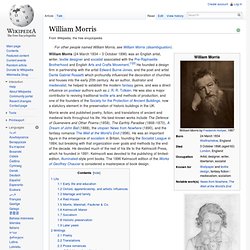
As an author, illustrator and medievalist, he helped to establish the modern fantasy genre, and was a direct influence on postwar authors such as J. R. R. Tolkien. Life[edit] Early life and education[edit] News from Nowhere. The book explores a number of aspects of this society, including its organisation and the relationships which it engenders between people.
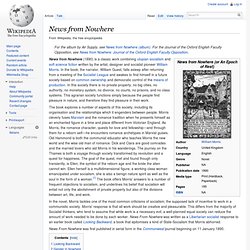
Morris cleverly fuses Marxism and the romance tradition when he presents himself as an enchanted figure in a time and place different from Victorian England. As Morris, the romance character, quests for love and fellowship—and through them for a reborn self—he encounters romance archetypes in Marxist guises. William Morris - Useful Work versus Useless Toil. The above title may strike some of my readers as strange.
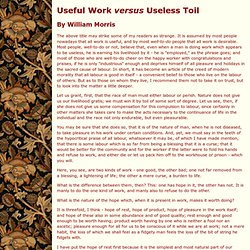
It is assumed by most people nowadays that all work is useful, and by most well-to-do people that all work is desirable. Most people, well-to-do or not, believe that, even when a man is doing work which appears to be useless, he is earning his livelihood by it - he is "employed," as the phrase goes; and most of those who are well-to-do cheer on the happy worker with congratulations and praises, if he is only "industrious" enough and deprives himself of all pleasure and holidays in the sacred cause of labour. In short, it has become an article of the creed of modern morality that all labour is good in itself - a convenient belief to those who live on the labour of others.
But as to those on whom they live, I recommend them not to take it on trust, but to look into the matter a little deeper. Let us grant, first, that the race of man must either labour or perish. Attention! Unto this last : four essays on the first principles of political economy. Benefit claimants are now seen as other – less than fully human. The government's cuts to welfare benefits are causing real harm to a lot of innocent people.
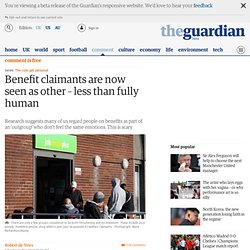
Nevertheless, remarkable numbers seem willing to support them, and all too ready to justify them with extreme aberrations. You can probably put some of this down to our straitened times. People struggling to get by in their own lives will find it hard to sympathise with those they feel are getting a free ride. However, at bottom, a lot of the bad feeling towards people on benefits comes from the way we now see them as a distinct, separate social group. Distinction between labour & work - Standing p7 para 4. Schole.
WAG p29 need for both leisure & play... Importance of contemplation & reflection - necessary to human development & so work 'we need an agenda that respects work & leisure rather than labour & play.' – gehan
WAG p28 we must rescue work from labour & reposition it so that all types of work are treated equally. Concepts matter; they affect the way we think about a subject. In labour markets people respond to prices & controllers, whereas in a true occupation people are motivated by dignity & morality. – gehan